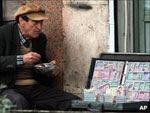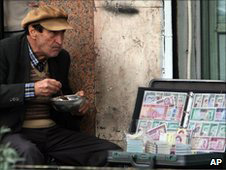 Wall Street Journal: Iranian authorities sent police into the streets of the capital Monday to crack down on informal currency trading and support the rial, signaling Iranians’ heightened insecurity over their dwindling buying power and Tehran’s increasingly hard-handed efforts to stave off economic panic.
Wall Street Journal: Iranian authorities sent police into the streets of the capital Monday to crack down on informal currency trading and support the rial, signaling Iranians’ heightened insecurity over their dwindling buying power and Tehran’s increasingly hard-handed efforts to stave off economic panic.
The Wall Street Journal
Police Sent to Monitor Black Market as Iranians Smart Over Dropping Rial, Inflation; Sanctions Threat Set Off Latest Fall
By BILL SPINDLE, BENOÎT FAUCON and FARNAZ FASSIHI
 Iranian authorities sent police into the streets of the capital Monday to crack down on informal currency trading and support the rial, signaling Iranians’ heightened insecurity over their dwindling buying power and Tehran’s increasingly hard-handed efforts to stave off economic panic.
Iranian authorities sent police into the streets of the capital Monday to crack down on informal currency trading and support the rial, signaling Iranians’ heightened insecurity over their dwindling buying power and Tehran’s increasingly hard-handed efforts to stave off economic panic.
The move follows last week’s steep Iranian Central Bank interest-rate increase, a bid to try to stem the growing demand for U.S. dollars in the country as the economy lurches amid fears over a new round of sanctions promised by the U.S. and Europe.
Iran’s rial currency has declined 40% to 55% against the dollar on the black market since December. Iranian inflation, meanwhile, now exceeds 20% a month, according to the Central Bank. While the rial has been falling for almost a year, the latest drop appeared to be triggered by a recent U.S. announcement that it would penalize companies that do business with Iran’s Central Bank, and a proposed plan to ban Iranian oil purchases in the European Union later this year.
The rial was changing hands at 16,000 to 17,000 in recent days, down from 11,000 to 12,000 in December.
The rial’s sudden decline has unnerved Iranians, from merchants and traders to everyday citizens looking to protect their savings against inflation.
“The economic situation in Iran is a disaster. Trade is at a minimum, and everyone is in a state of panic,” said Abdullah, a 47-year-old merchant in Tehran’s grand bazaar. He imports and exports semiprecious stones and silver, and says this month he is making less than $100 a day on average for a store that costs $400 in rent and expenses. “We are all slowly going bankrupt.”
Since the rial started plummeting in December, Iranians say many people have rushed to turn their capital into dollars or gold. Many middle-class Iranians are selling properties and withdrawing money from saving accounts that promised a 17 percent interest rate.
Iranian newspapers dedicated much of their front pages to the news of the currency rates and the government crackdown on black-market dealers. By midday Monday, the official news agency IRNA reported that money-exchange shops weren’t buying or selling dollars and didn’t list a price on their board. Black-market handlers continued to deal in the back alleys of downtown Tehran, according to IRNA.
The U.S. and European governments see the Iranian currency’s fall as a significant victory in their efforts to use stepped-up sanctions to hobble the Iranian regime—which they accuse, to Tehran’s protest, of pursuing nuclear weapons. Iran’s clerical regime sees defending the currency as an important act of defiance.
U.S. officials acknowledged that the growing sanctions campaign is going to further inhibit Iran’s ability to conduct trade while feeding inflation and draining Tehran’s foreign-exchange reserves. They said their policies aren’t aimed at hurting the Iranian people, but they say they hope internal discontent will pressure Iran’s government to make concessions on its nuclear program.
Several Iranians said the international moves angered them, arguing that the people, not their government, would pay the price, particularly for sanctions on Iranian oil. They said sanctions on Cuba, North Korea and Saddam Hussein’s Iraq didn’t lead to a government collapse, but on a populace that is poor and dependent on state welfare.
The U.S. move to punish companies that deal with the Central Bank—signed by President Barack Obama in December but set to take effect later this year—threatens Iran’s ability to sell oil because nearly all of Iran’s oil sales are cleared through the bank. Meanwhile, the EU ban, also intended to take effect later this year, would cut off Iran at least partly from some of its biggest customers.
The U.S. and European actions set off threats by Iran to close the Strait of Hormuz, through which about one-fifth of the world’s traded oil passes. Iran also staged military exercises in the strait. The rising tensions came as Iran’s economy was already struggling with a rising inflation rate and slow growth.
Many Iranian business and industrial leaders have long asked for a weaker currency, which would help boost exports and provide some relief to domestic companies competing with ever cheaper imports from Asia.
But the sudden drop in the rial’s value over the past two weeks, combined with U.S. pressure on any companies doing business with Iran, has played havoc with importers.
“Not only is it difficult to find a way to pay, but even if a payment method can be found, Iranians simply cannot afford to pay when the time comes,” said Nigel Kushner, chief executive of Whale Rock Legal Ltd., in London, who advises companies on sanctions.
In Dubai, through which much of Iran’s trade is channeled, merchants say Iranian traders have all but disappeared in recent weeks. “We lost about one-third of our business,” said Nabil Ahmed, who sells appliances and air conditioners. “From Iran it’s completely stopped.”
Despite the drop in the black-market exchange rate, the government has held the official exchange rate unchanged at about 14,000 rials per dollar. That has added to the economic turmoil, by allowing companies and individuals connected to the government to buy dollars at the official rate and profit by selling in the informal markets.
“If I’m competing with a government entity, I don’t have a chance,” said Siamak Namazi, an Iran analyst and consultant based in Dubai. “It’s not a level playing field anymore.”
Some Iranian industrialists, particularly those who export their goods, said they stand to benefit from the rising price of foreign currencies. They say industries that don’t rely on imported raw materials—including glass, carpet and food businesses—will fare well, but others will have to add to the final price to compensate for pricier raw materials from abroad.
In the northeastern city of Mashad, a businesswoman named Farideh, who owns a carpet-weaving factory, said she has had to lay off several workers and cut production in the past two months as the market has fluctuated and inflation increased. Personally, the 44-year-old mother of five children says her purchasing power has dropped 30 percent in just two months.
“I am living day to day. I don’t know if we will be able to keep our business or pay our rent in a few months,” she says. “Other people less fortunate than me are worried about feeding their children.”
Last week, the Central Bank told banks to sharply increase interest rates on bank deposits to 21% from as little as 14%, to encourage Iranians to keep their money in rials and suppress the black-market rate.
Still, with inflation informally running as much as 19%, the demand for dollars has continued. On Sunday, the government announced the ban on informal trading. On Monday, Deputy Central Bank Gov. Ebrahim Darvishi announced that authorities would shut down the black market and enforce the official rate at authorized foreign-exchange houses.
“Do not take it to the market,” Mr. Darvish said on state radio, referring to foreign currency such as the U.S. dollar, according to the Associated Press. “Any investment in the field of foreign currency and the dollar is forbidden.”
—Jay Solomon contributed to this article.


